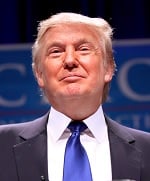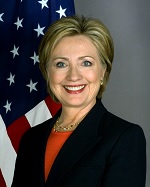 |
| Donald Trump |
By Emily Wasserman and Tracy Staton
Democratic presidential candidates Hillary Clinton and Bernie Sanders have already taken aim at pharma, talking up plans to give Medicare power to negotiate drug prices. Now, a less likely candidate has backed the idea: Donald Trump.
Trump told a crowd of 1,000 people in Farmington, NH, this week that Medicare could save $300 billion a year by negotiating discounts. "We don't do it," Trump said. "Why? Because of the drug companies."
It's a major departure from the Republican party line. Proposals for Medicare price negotiation have come through Congress repeatedly, and Republicans knocked them back every time. President Obama has pitched the idea at least twice himself, always to be decried by his Republican rivals.
Trump, now the Republican front-runner, didn't seem fazed by that history, or by the pharma industry's lobbying power in Washington. Trump not only backed price negotiation, but also pointed fingers at Big Pharma during his speech. He singled out Pfizer ($PFE), for instance, for its "tax inversion" merger with Allergan ($AGN), which will move its home base to tax-friendly Ireland. Pfizer is "leaving us and we're still not doing anything," he said, echoing other calls for the U.S to somehow block the move.
The law that created Medicare Part D prescription drug benefits expressly barred the program from using its market power to negotiate drug prices. Industry groups have worked hard to keep those protections--and they're continuing to push back against the idea, even as drug companies come up against a rising tide of discontent over pricing.
 |
| Hillary Clinton |
But Clinton and Sanders--and now Trump--aren't ready to throw in the towel just yet. Clinton unveiled a plan last year that would allow Medicare price negotiation and other measures, such as caps on consumer copays. Sanders, a longtime champion of drug pricing reform, introduced a bill last year that includes Medicare price negotiation and drug re-importation, another idea that's been voted down in Congress.
Meanwhile, lawmakers are continuing their assault on drug pricing. In December, the Senate Special Committee on Aging led by Sen. Claire McCaskill (D-MO) held its first hearing over drug price increases, taking aim at companies including Turing Pharmaceuticals and Valeant Pharmaceuticals ($VRX) for jacking up prices on certain meds. The price hikes raise "troubling questions about whether companies like Turing and Valeant are taking advantage of the patients who depend on their products for survival," McCaskill said at the time.
In the House, vocal pricing critic Rep. Elijah Cummings (D-MD) is leading the charge. As ranking Democrat on the House Committee on Oversight and Government Reform, Cummings pressed for a price-hike hearing that's now slated for next week. Turing's controversial ex-CEO Martin Shkreli and Valeant's interim chief, Howard Schiller, are both on the docket for grilling about their astronomical price hikes.
Lawmakers subpoenaed Shkreli in early January, but he asked to be excused, citing the terms of his bail in an unrelated securities case; he said he planned to "plead the Fifth" if forced to appear. The committee rejected the request. Now, the judge presiding over Shkreli's securities case has cleared him to leave New York for the Feb. 4 hearing.
- read The Hill story
Special Reports: 10 big brands keep pumping out big bucks, with a little help from price hikes | The top 10 most expensive drugs of 2013